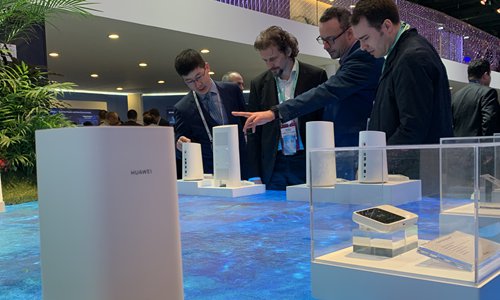
Visitors check out Huawei's latest 5G products at the MWC19 in Barcelona, Spain on Monday. (Photo: Global Times)
The Mobile World Congress (MWC), the annual telecoms industry gathering in Barcelona, Spain, has become a major battleground for Chinese companies such as Huawei Technologies and ZTE Corp as they seek to beat back political pressure stemming from the US-led campaign against China's high-tech rise.
At the event, which runs from Monday to Thursday, Huawei impressed a global audience with its latest products, particularly a 5G foldable smartphone, and its executives directly took on the US criticism in interviews.
Huawei is in the spotlight at this year's event, as the US has been accusing the Chinese telecom giant of posing security risks to other countries and allegedly spying for the Chinese government through its products.
Beyond just making accusations, the US has also been lobbying in Europe, urging local authorities there to institute formal bans on Huawei products when it comes to building out the next generation of wireless mobile networks, also known as 5G.
A delegation of at least eight US officials is expected in Barcelona, two weeks after US Secretary of State Mike Pompeo warned that Huawei equipment would jeopardize European allies' partnerships with the world's largest economy, Reuters reported on Monday.
Huawei, which is also the largest telecom equipment provider worldwide, has denied the US accusations and publicly stated that it will never hurt the interests of consumers or business partners.
"In spite of political pressure from the US government, Huawei will cooperate with partners around the world to succeed in the 5G era," Guo Ping, the company's rotating chairman, told the Global Times ahead of the opening of the MWC on Sunday in Barcelona.
"Over the past few months, we have faced cybersecurity challenges by a certain country," Guo said, in an apparent reference to the US government. "Who is secure or not, should not be decided by politics," he said.
Many industry representatives stressed that the US should not politicize the development of 5G networks, and security concerns should be dealt with in accordance with fact-based assessment.
The GSMA - an industry body representing hundreds of mobile operators - which is also the organizer of the annual event, has urged the sector not to lose focus on relevant policies in securing the 5G network infrastructure, which should be undertaken in line with the facts and a risk-based approach.
In terms of cybersecurity evaluation and assessment, out of 12 indicators, Huawei leads in nine of them. In the other three, it has had above-average performances, Guo said, "and we'll continue working with partners to improve cybersecurity."
Stepping up
Facing the US pressure, Huawei has not downplayed its ambition to lead 5G innovation. The company unveiled the latest foldable 5G smartphone called the Huawei Mate X, part of the global race for 5G devices.
The Huawei Mate X is powered by Balong 5000, the company's first self-developed 5G modem, and Kirin 980 processor, offering an affordable full-view display.
This latest gadget does not have any notches or gaps when folded, and industry experts have said that it is the most promising foldable phone released so far.
"It is equipped with the world's first 7 nanometer multi-modem chipset, which also supports both standalone (SA) and non-standalone (NSA) networks," said Huawei CEO Richard Yu Chengdong during the launch event on Sunday.
From follower to front-runner, the Chinese smartphone vendor now plays an important role in leading innovation compared with its foreign rivals, which will also help the ecosystem grow, James Yan, research director of market consultancy Counterpoint Research, told the Global Times.
Local carriers in Europe suggested that a blanket ban on Huawei will have significant implications for the local industry, and some have welcomed the partnership with the Chinese company in spite of US pressure.
Major carrier Vodafone showcased a real-time demo of a 5G video call with the Huawei Mate X over Vodafone's 5G network in Barcelona. Vodafone Spain confirmed that Huawei is its main 5G provider, local media Expansion reported on Monday.
US President Donald Trump recently tweeted a call to US firms to step up 5G development and build faster networks, and he suggested that the US should not block any player in 5G race.
"I think his message is clear and correct," Guo told the Global Times, when asked about Trump's tweet.
"Due to various complex reasons, Huawei basically does not exist in the US market," he said, noting that the US does not represent the whole world. Even without the US, the Chinese company has achieved business growth, driven by robust demand in the technology and communications industry.
"Our future will not be decided by that [US influence]," he told the Global Times.


